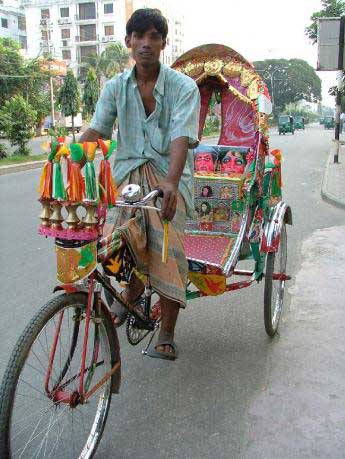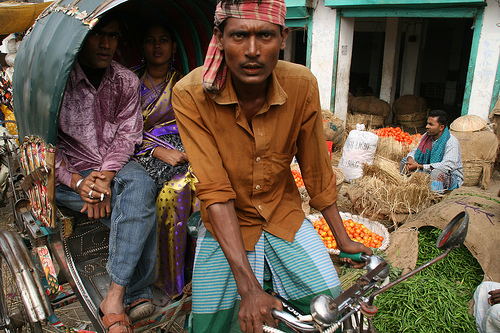Last summer I saw something that completely shocked me. I witnessed a man attempting to unclog a flooded street in Dhaka, Bangladesh. That doesn’t sound too shocking, but given the circumstances, I can assure you it was. In his attempt to do so, he was forced to go down the sewer, half naked, with no protection, into a filty, disease infested flooded street. At first glance, I couldn’t tell that the round shaped dark object sticking out from the water was the head of a man neck deep down a sewer. Several times he came back up to empty his hands of the garbage that had clogged the sewer in the first place. What frustrated me the most was knowing that this man was being paid slim to none and risking this health to do so. If it was a government job, the least the gov’t could do is provide some sort of protective gear, forget any equipment!
FINALIST 2010 YOUNG TRAVEL WRITERS SCHOLARSHIP



Poverty comes in many forms here in Bangladesh. One that seems most prevalent to the eyes of a foreigner is that of the rickshaw-wallah. This is the Bangaldeshi rickshaw:


There are 15 million rickshaw-wallah’s in Bangaldesh. Their job is so physically demanding that after 10 – 12 years, it becomes almost impossible to continue. Many foreigners have asked rickshaw-wallah’s if they can try out pedaling the rickshaw (I have yet to try), and from what I’ve heard, pedaling that rickshaw while it’s empty for even a minute is extremely difficult. Imagine carrying a family of 3 (300 lbs – 400 lbs) for 15 – 20 minutes at a time and then being paid 40 Tk (~$0.50) to do so! Even more, the price is never set beforehand, and some very shameless people walk away giving them a mere 10 Tk.
I met a film-maker this past weekend who was doing research on the life of rickshaw-wallahs. He informed me that of the 15 million rickshaw-wallah’s in Bangladesh (that’s 10% of the population), nearly 99% of them didn’t own their own rickshaw! Instead they rent these rickshaw’s for 100 – 150 Tk a day, while they make only 300 – 400 Tk. Many times they work until 10pm or midnight just so they would have enough money to pay for rickshaw rent, food, and other expenses. Given that a new rickshaw costs over 20,000 Tk, saving up enough money is almost impossible. They return home to the slums called “shanti’s” and crash, many times after taking their frustrations out (physical abuse) on to their wives. Poverty leaves these men and their wives with little to look forward to in life.
Below is a video of a slum in Dhaka. Families of 5, 6, 7 reside in one single room with little hygiene, not to mention the zero privacy. If you can, try to make out the sewer that dumps out waste into the river, and a little ways down, a young girl washing her clothes in the same contaminated and polluted water. Across the river reside some of the country’s wealthiest in nicely furnished AC apartments.
The welfare programs, food stamps, and housing that the government promised during election season are no where to be found. But the corrupt government is not the only institution to be blamed for such circumstances. I’m sure you’ve heard of the expression, ‘The wealthy thrive off the poor.’ Bangladesh is a great example. 50 years ago, the number of rickshaw drivers was 1/4 of what it is today. This isn’t simply because of population growth. Rather, the increase of rickshaws is a result of a number of factors, for example, greedy foreign interventionists. Many rickshaw-wallah’s parents and grandparents were once farmers in rural villages, making their own crops, selling them, and having enough to feed the family without going through 12+ hours of physically exhausting labor. What happened? Foreign agricultural companies came and took over their land, forcing thousands to flee to the city. Another factor was the fact that the market switched to selling these farmers “hybrid” seeds that weren’t reproducible, utterly making these farmers slaves to the market and its rising prices.
Development in some countries means thriving off the undeveloped ones, the wealthy thriving off the poor. It’s a wretched cycle that can be traced back to colonialism. This colonialism may be written in history books as something of the past, but it never ceased to exist. It’s there, just in disguise.
Dear Reader: This page may contain affiliate links which may earn a commission if you click through and make a purchase. Our independent journalism is not influenced by any advertiser or commercial initiative unless it is clearly marked as sponsored content. As travel products change, please be sure to reconfirm all details and stay up to date with current events to ensure a safe and successful trip.
